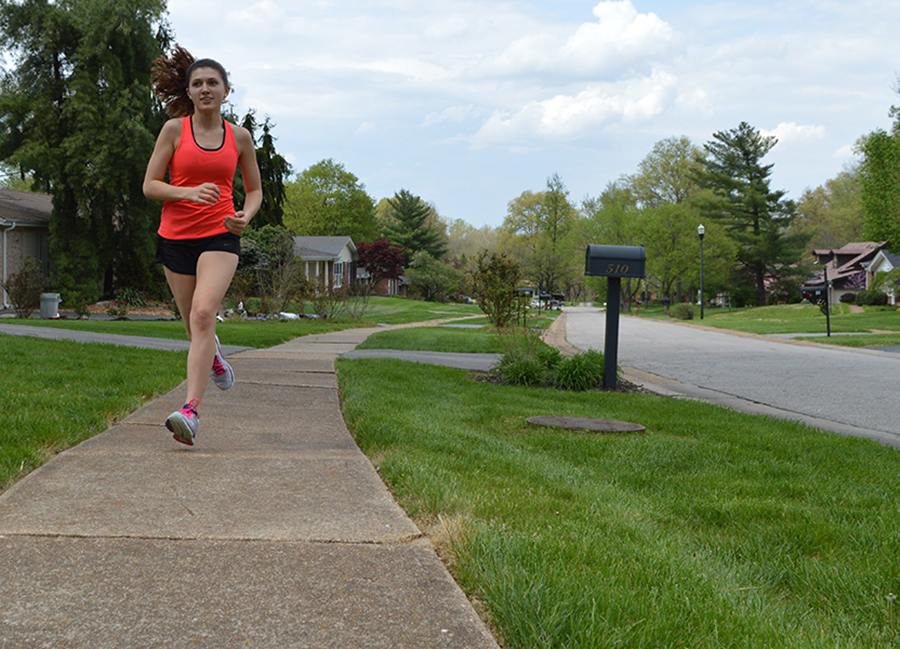Catcalling, commenting or yelling at women passing by, is a widespread problem among the girls who run track and cross country. ¬Ý
“They tell me and my teammates to run faster, they comment on our bodies or they just yell and try to scare us,” sophomore Natalie Butler said.
According to junior Emily Dickson, she gets catcalled every time she runs on the road.
“It doesn’t matter what you’re wearing, people are still going to yell at you to go faster,” Dickson said. “The more directive comments come when you’re just in a tank top or in your sports bra and shorts, but it’s not our responsibility to change what we wear because of the people [catcalling us].”
Despite the numerous instances these girls are catcalled when they run, in their experience, it is always men who catcall them.
“It’s alarming how much it has become a norm in life and I think it needs to be stopped,” Butler said. “Men should be taught respect.”
Although catcalling is often ignored, it is a form of sexual objectification because it isolates a woman’s body from her whole self.
“When men are taught to look at woman as just an object for their own pleasure or desire, that gives them automatically the green light in their head to do whatever they want and not look at that woman as somebody on the same level of humanity as them,” freshman Emma Caplinger said.
The effects of catcalling, according to an article by NYU, can be forms of depression and anxiety due to the internalization of the objectification.
“I think it’s really degrading because obviously any human is worth more than just their outside, but every woman I know is so much more than just ‘oh wow she’s hot,’” Caplinger said. “Nobody is asking for a man to call at them or make noises at them, nobody wants to be looked at as anything less than their entire person, so I think it definitely affects people by making them feel like they’re being seen as less than they are. ”
Catcalling does not just occur among a few women though, in fact, according to a survey done by the nonprofit organization Stop Street Harassment, out of the women surveyed, 99 percent had experienced a form of street harassment.
“All the ladies I know that run have definitely experienced this, like my mom, my aunts and a lot of runners in my family. When you think about it, it’s really kind of gross and unsettling to know that this is such a common issue,” Caplinger said.
According to an article by Unicef, the objectification of women is seen everyday in magazines, television and other media sources, which not only lowers self confidence in women, but also furthers harmful gender stereotypes. ¬Ý
“I think it just comes to down to years and years of it being seen as okay to objectify women, especially in the media,” Caplinger said. “I mean I think we’re moving in a progressive path by noticing that objectification is such a problem, but I think that men in particular have just seen it as okay for so long that it’s just stuck in their mind.”
Although catcalling has been happening for a long time, one thing that everyone can do is help bring awareness to it, so that girl runners can train without being objectified.
‚Äú[Catcalling is] important to talk about because I just feel like guy runners don‚Äôt realize like how much we actually do get catcalled. Especially after you‚Äôve been running for a while, you stop talking about it because it‚Äôs just a fact of the run,‚Äù Dickson said. ‚ÄúOur runs shouldn’t be harder just because we are girls.‚Äù




![Sitting courtside before a junior varsity girls’ tennis match, senior Tanisi Saha rushes to finish her homework. Saha has found herself doing academic work during her athletic activities since her freshman year. “Being in sports has taught me how to stay organized and on top of my schoolwork. [With] a busy practice and game schedule, I’ve learned to manage my homework and study time better,” Saha said.](https://pwestpathfinder.com/wp-content/uploads/2025/11/DSC_0022-1200x800.jpg)
![Sophomore Maryem Hidic signs up for an academic lab through Infinite Campus, a grading and scheduling software. Some students enjoyed selecting their responsive schedule in a method that was used school-wide last year. “I think it's more inconvenient now, because I can't change [my classes] the day of, if I have a big test coming and I forget about it, I can't change [my class],” sophomore Alisha Singh said.](https://pwestpathfinder.com/wp-content/uploads/2025/10/DSC_0012-1200x801.jpg)
![Senior Dhiya Prasanna examines a bottle of Tylenol. Prasanna has observed data in science labs and in real life. “[I] advise the public not to just look or search for information that supports your argument, but search for information that doesn't support it,” Prasanna said.](https://pwestpathfinder.com/wp-content/uploads/2025/10/DSC_0073-2-1200x800.jpg)
![Junior Fiona Dye lifts weights in Strength and Conditioning. Now that the Trump administration has instituted policies such as AI deregulation, tariffs and university funding freezes, women may have to work twice as hard to get half as far. "[Trump] wants America to be more divided; he wants to inspire hatred in people,” feminist club member and junior Clara Lazarini said.](https://pwestpathfinder.com/wp-content/uploads/2025/05/Flag.png)
![As the Trump administration cracks down on immigration, it scapegoats many immigrants for the United States’ plights, precipitating a possible genocide. Sophomore Annabella Whiteley moved from the United Kingdom when she was eight. “It’s pretty scary because I’m on a visa. When my visa expires next year, I’m not sure what’s going to happen, especially with [immigration] policies up in the air, so it is a concern for my family,” Whiteley said.](https://pwestpathfinder.com/wp-content/uploads/2025/05/DSC_0077-7copy.jpg)
![Shifting global trade, President Donald Trump’s tariffs are raising concerns about economic stability for the U.S. and other countries alike. “[The tariffs are] going to pose a distinct challenge to the U.S. economy and a challenge to the global economy on the whole because it's going to greatly upset who trades with who and where resources and products are going to come from,” social studies teacher Melvin Trotier said.](https://pwestpathfinder.com/wp-content/uploads/2025/05/MDB_3456-1200x800.jpg)



![Some of the most deadly instances of gun violence have occurred in schools, communities and other ‘safe spaces’ for students. These uncontrolled settings give way to the need for gun regulation, including background and mental health checks. “Gun control comes about with more laws, but there are a lot of guns out there that people could obtain illegally. What is a solution that would get the illegal guns off the street? We have yet to find [one],” social studies teacher Nancy Sachtlaben said.](https://pwestpathfinder.com/wp-content/uploads/2025/01/DSC_5122-1200x800.jpg)
